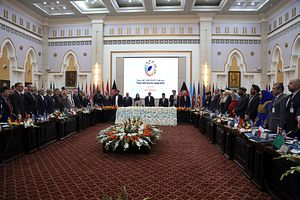From March 25-27, delegations from across the region and around the world will gather in the Uzbek capital, Tashkent, specifically to confront the Afghanistan problem. The conference, co-hosted with the Afghan government, follows innumerable other efforts to breathe life into the peace process in Afghanistan.
Like the Samarkand security conference last fall, this gathering is perhaps more reflective of Uzbekistan’s regional reengagement than it is of specific conditions in Afghanistan. That said, there are countless variables to consider which make the moment right to keep pushing the idea of peace or at the very least keep interested parties talking: concerns about the rise of Islamic State in the region, U.S. attention shifting from Syria back to Afghanistan and the impending increase in troops, and tensions between Pakistan and Afghanistan (as well as Pakistan and the United States), among other regional trends, particularly the economic impetus for settling the war.
The official conference is set to kick off on March 26, though on March 25 the foreign ministers from the five Central Asian states will meet with Afghan officials — a variation on the C5+1 concept, only swapping the Afghans in for the Americans.
The full conference will be attended by the Central Asian foreign ministers, plus diplomatic representatives from the United Nations, United States, Russia, China, the European Union, Germany, France, Italy, the United Kingdom, India, Pakistan, Turkey, Iran, Saudi Arabia, and the United Arab Emirates.
The parties are expected to adopt a declaration setting out their shared vision with regard to peace in Afghanistan. A draft of the declaration viewed by The Diplomat features familiar language about an “Afghan-led and Afghan-owned” peace process and an emphasis on the importance of a political settlement. While the draft is just that — a draft still under negotiation — it provides a glimpse of what the conference’s organizers hope to achieve. It includes language urging the Taliban and the Afghan government to begin direct talks and supporting a peace settlement that provides the Taliban a pathway into normal politics, predicated on a renunciation of violence and a pledge to respect the Afghan constitution. The draft also includes references to counterterrorism and counternarcotics efforts as well as regional economic cooperation — viewing them all as parts of achieving a comprehensive peace in the region.
The organizers acknowledge previous and ongoing efforts in tandem with the Tashkent conference, including the Kabul Process, which held its second meeting last month. But the graveyard of past peace efforts is filled with hopeful attempts gone awry, such as the Quadrilateral Coordination Group (QCG) effort of 2016.
Indeed, the last time Tashkent hosted a conference about peace in Afghanistan was the 6+2 Contact Group’s first meeting in July 1999. The group included Afghanistan’s direct neighbors — China, Iran, Pakistan, Tajikistan, Turkmenistan, and Uzbekistan — plus the United States and Russia. Uzbek President Islam Karimov’s initiative nominally aimed to find a peaceful political solution to the war in Afghanistan. In any case, the 1999 Tashkent Declaration, which featured the parties agreeing not to provide military support to any Afghan party and urging the Taliban to stop providing refuge to international terrorists, was followed by a Taliban military offensive. In retrospect, knowing what we know about outside support for both the Taliban and the Northern Alliance during that period, the 1999 declaration looks absurd.
Bringing us back to the present, why is Uzbekistan only now re-engaging in the swirl of international diplomacy surrounding Afghanistan? Put simply: the time is right for Tashkent.
In late February, Uzbekistan’s Ambassador to the United States, Javlon Vakhabov, delivered remarks in which he underscored the confluence of events that make the time right. He noted the decades of war that have ravaged the region, increasing international attention to the issue, and the general regional opening.
As I’ve written previously, Central Asia broadly has made efforts over the last year to up its engagement with Afghanistan. Uzbekistan’s position shifted in particular after Karimiov’s death and the general opening of the country, in diplomatic terms at least, that came with the rise of current President Shavkat Mirziyoyev.
There’s a relevant regional economic calculous in Uzbek minds where Afghanistan in concerned. Mirziyoyev’s big dreams of regional connectivity mean little without peace to the south. War in Afghanistan, even if it never spills over (a term I hate) northward, creates concerns in the minds of investors. Furthermore, Afghanistan is between double-landlocked Uzbekistan and countries with access to the ocean. Tashkent’s interests in building up Afghan rail infrastructure are part and parcel of a perhaps stereotyped but very real search for sea access.
So, what should we expect from the Tashkent conference? Surely a declaration, but as the 1999 Tashkent Declaration illustrates, that may be just so many words on a piece of paper. More important will be the ways in which the involved parties interact and whether any of them can get the Taliban to the table.
Vakhabov, Uzbekistan’s ambassador to the United States, was clear in his recent remarks that Tashkent doesn’t except to solve the Afghan problem. “We don’t have illusions on the outcomes, and we don’t pursue overly ambitious agenda to this end either.” But, he said, the conference would reinforce previous efforts — particularly the Kabul Process — and hopefully engender “mutually agreed solutions to this
long standing problem.”

































